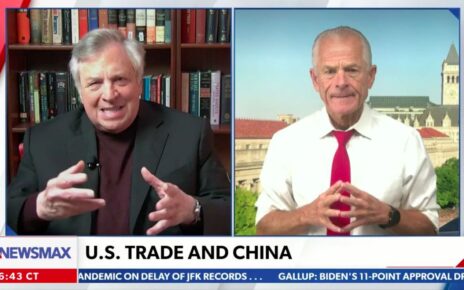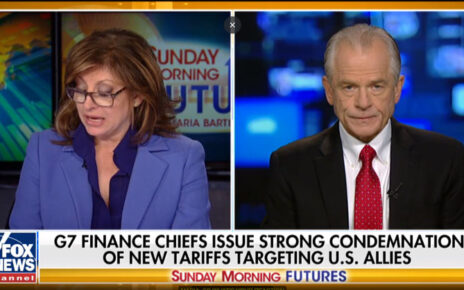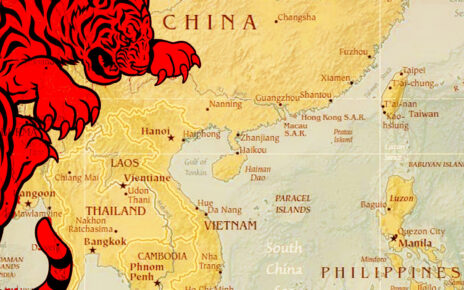January 24, 2017 – FBN, Mornings with Maria
Maria Bartiromo: Joining us now is Peter Navarro. He is the Director-designee of the White House National Trade Council. Peter, it’s good to see you. Thanks for joining us.
PN: Great to talk to you, Maria. It’s been awhile.
Maria: Yeah, I haven’t spoken to you. Congratulations on everything; you’ve been a key advisor to the President as it relates to trade. We want to talk about this. What are the immediate impacts – first – of Trump’s announcements on rolling back these regulations? How do you see the timing of this actually impacting and moving the needle on growth and business?
PN: It’s good to hear Mark Fields basically outline the Trump strategy, which is to cut taxes, cut regulation, and improve our trade situation. Uh, we’re hitting on all cylinders. Every day there’s going to be announcements by this team on each one of those points of the compass. My job at the National Trade Council is to stand up for American workers, American manufacturers, and to create jobs every day.
Maria: What kind of pushback, Peter, do you hear from the CEOs who say, “Look: We’ve got international businesses. Yes, we want to create jobs in the U.S., but we do have headquarters as well as big operations overseas and we don’t like the idea of a border tax.”
PN: The Border-Adjustment Tax (BAT) is an interesting proposal that the Congress is putting forward. Uh, the problem, Maria that we’re facing internationally is we’re the only country that has an income tax. Every other country has a value-added tax (VAT). And under the unfair rules of the World Trade Organization (WTO), these countries are able to basically rebate exports into this country and get, effectively, a subsidy and then they slap a VAT tax on us when we try to export. The corporations in this country can’t operate on a level playing field. So, the border-adjustable idea is designed to explicitly level that playing field. President Trump during the campaign clearly articulated the problem of the VAT tax and unequal treatment and that’s one the Administration hopes to work closely with Congress on as part of the tax reform. And I would say, Maria, that there’s nothing more important in that tax bill from a job creation point-of-view than getting that corporate tax down to 15%, like President Trump promised he’d do.
Maria: I want to ask you the timing on that because we’ve been talking about understanding exactly what the tax program will look like in the first 100 days but not actually seeing it implemented until later on in the year during budget reconciliation. Are you expecting tax reform to be retroactive to January 1, 2017, Peter?
PN: Maria, I’m here basically a day after one of the most historic days in American political history, which is the killing of the Trans-Pacific Partnership (TPP). I’d like to just focus on that for a minute. That was an historic event in the Oval Office. I was standing there when that pen put that signature on that. It was a great day for American workers. It was a great day for American manufacturers. It was a great day for the auto industry in this country, particularly in states like Michigan and Ohio, which are strong Trump supporters. The TPP would have killed that industry. And what was important about that order, Maria, was that as part of that order President Trump pledged to negotiate with our allies in Asia and around the world on free but fair trade deals. And we’re going to get on with discussions about that as quickly as that pen went across signing that TPP. I think it’s really important – I think it’s a historic event. It should not go unnoticed.
Maria: Absolutely, and I was going to bring that up after the tax reform question but let me stay here and put tax reform aside for a second because he signed three executive orders, including scrapping the U.S.’s involvement in TPP. I watched you standing there watching him sign it. And I know, you know, this was also partly, a success for you, because you worked so hard on this work and doing better trade deals. What do you want these trade deals to look like? I mean, when you actually say, “Okay, we want to do bilateral deals.” How will trade change and look different in the coming year or two when we’re not looking at big deals with several different countries?
PN: So the big thing from an economic standpoint and for workers in this country is to think about it this way. The big boxes that have the logos like Ford, GM, and GE on them in this country that people associate with manufacturing jobs have basically turned primarily into assembly plants that put together components from foreign countries. So, one of the most important things that we want to try to do is rebuild our supply chain by significantly increasing the rules-of-origin requirements across our bilateral trade deals. It’s a little bit of inside baseball for America but this is something that America really needs to tune in. The problem that we’ve had over the last 15 years of bad trade deals with virtually the entire world is we haven’t paid attention to that supply chain. It’s the supply chain in America that provides the jobs to American men and women and we’ve got to stop simply assembling foreign components and stamping a “Made in America” thing on them when, in fact, they’re made in the rest of the world. So our bilateral trade deals will focus on that. That’s going to be really important.
And Maria, one of the biggest issues with any trade deal is going to make sure that any country that we’re negotiating with will reduce our trade deficit with them if we have that. The Trump trade strategy with any deal is to increase economic growth, reduce the trade deficit, and – importantly – to strengthen both the manufacturing base and the defense industrial base. As the Director of the National Trade Council, I look forward, for example, to working with General Flynn and KT McFarland at the National Security Council, on these issues where we’ve got one factory in this country that builds propellers for our ships. It’s perilous. So these are the kinds of things we need to be doing. Paying attention to detail. Putting American men and women back to work in manufacturing facilities not just in the big boxes but in the supply chain – second and third tier supply chain.
Maria: So, real quickly then, Peter: What do you want to hear from the automakers then today? President Trump is meeting with the auto CEOs. What is he going to ask them to do in that regard?
PN: Well, the automakers should embrace tax reform – lower corporate taxes. We’d love to hear that these companies want to produce here in America with American parts and components and be able to sell to the world without being slapped with things like VAT tax excesses where they can’t compete fairly. And they’ve never had, in the last 15 years, a President in the White House who will support American corporations exporting to the world.
Maria: So, before you go, Peter, we talked real quick about tax reform. Do you think we will see lower taxes on the corporate side in ’17? No question. We’re hitting the ground running on trade, on taxes, on regulation. There’s an eagerness in Congress – on the Hill – to get tax reform. President Trump wants tax reform. Maria, we got to cut that corporate tax to make America more competitive again. Let’s get it done.
Maria: Peter, wonderful to see you. Thanks very much.



